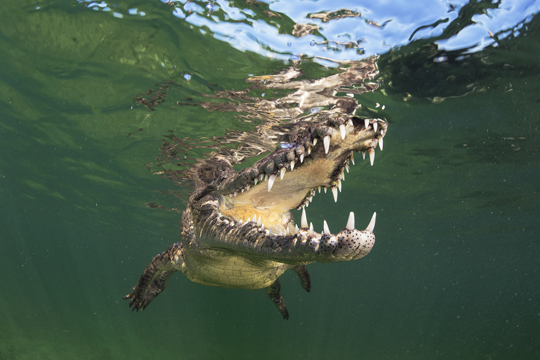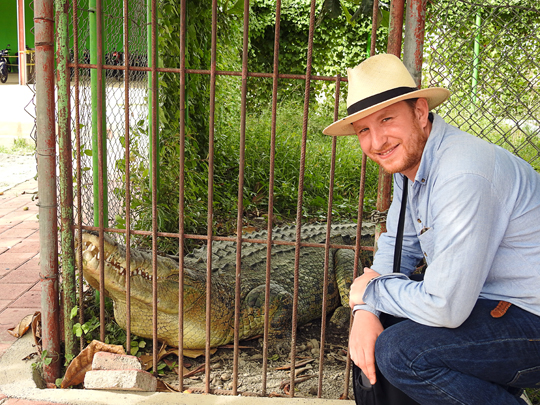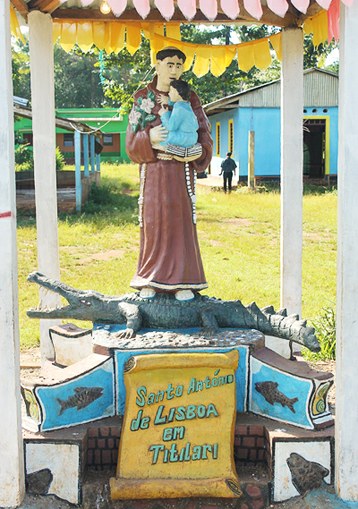Grandfather Crocodile
Freiburg, Jul 16, 2019
Animals are revered in many countries. In Thailand, for example, it's elephants. In India, cows are considered holy. On East Timor, an island in Southeast Asia, the object of veneration is quite truly a dangerous being – the crocodile. A doctoral student at the University of Freiburg, Sebastian Brackhane, has done a study that explores the cultural status of salt water crocodiles on the island in order to develop wildlife management programs.
 The number of crocodile attacks has risen sharply in recent years. Photo: The Ocean Agency/stock.adobe.com
The number of crocodile attacks has risen sharply in recent years. Photo: The Ocean Agency/stock.adobe.com
A crocodile rises slowly out of the river. It looks dangerous, lurking half out of the water to survey its surroundings. But the children watching it from a bridge aren't afraid. They smile happily and call to it in the local language, "Grandfather Crocodile!" A similar scene could take place almost anywhere in the Southeast Asian country of East Timor, because crocodiles are holy there. The divinity of the crocodiles can be traced back to the myth of the island's origins. "Once upon a time, a crocodile rescued a little boy and carried him around all over the place. When the crocodile died, the island of East Timor was formed," explains Brackhane, a doctoral candidate of the Faculty of Environment and Natural Resources at the University of Freiburg. He has been examining the custom of crocodile worship in East Timor and has already published two studies.
Still dangerous despite its sanctity
The special relationship between humans and the animals is apparent not only from a ban on killing them and the nickname the residents have for the reptile – "Grandfather Crocodile." Customs and trademarks reflect it as well. "There are rituals for salt water crocodiles, for example, that involve the sacrifice of other animals. At a national level, the soccer team and East Timor's biggest telecommunications company have crocodiles in their logos," reports Brackhane. But the relationship has dark sides, too. The number of crocodile attacks has risen sharply in recent years.
 Sebastian Brackhane is developing approaches that will allow humans and crocodiles to coexist safely. Photo: Yusuke Fukuda
Sebastian Brackhane is developing approaches that will allow humans and crocodiles to coexist safely. Photo: Yusuke Fukuda
Researchers are unable to put a precise figure on the number of attacks. They estimate one incident each month on average, with a far higher number going unreported. "Everything is scarce in East Timor, and above all, there's a lack of standardized wildlife management," says the researcher as he describes the situation in the island country. "But we surmise the actual number of unreported attacks is likely higher because the East Timorese view the crocodile as a judge who punishes environmental abuse. People believe that if you are attacked by a crocodile, you must have done something bad to 'Mother Nature'," explains Brackhane. "We assume that little is said about the attacks because if you do so, you run the risk of being socially ostracized," he continues.
Attack increase still puzzling
Attack is a threat on all of East Timor's coasts and inland waterways because this type of crocodile is able to live in fresh and salt water. The animals do not confuse people with other prey as great white sharks do, for example. On the contrary, humans are a natural source of food for salt water crocodiles.
Yet the researchers are still unable to pinpoint the actual reasons for the increase in attack numbers. They could not find a link between the incidents and the culture of worship. "What we do surmise, however, is that the myth of the island's origins gives people a false sense of safety," says Brackhane. Another reason could be that some of the salt water crocodiles have migrated from Australia and could be particularly hungry and aggressive after the long trip. "Population sustainability in Australia has been reached. The crocodile numbers there cannot increase because of the absence of the required nutritional foundation. Subsequent generations head off to look for new territories and could be coming to East Timor," he says. Brackhane is at the moment investigating together with his Australian colleagues the theory that migrating crocodiles could be responsible for the attacks.

A saint and a holy crocodile: The belief in crocodiles has even been incorporated into the work of the Catholic missionaries on East Timor. Photo: Sebastian Brackhane
Looking for solutions
Hunting crocodiles is illegal. The animals have been protected by law since 2000. But a solution that reduces the number of attacks and harmonizes with cultural beliefs needs to be found quickly in order to protect the residents of East Timor. In the short term, they are currently relying on education, above all, to remedy the situation. "The local crocodile task force has already posted warning signs in all the high risk areas and is often on the road giving workshops," says Brackhane. In the long term, there are a range of wildlife management strategies for handling the situation. One option would be to catch crocodiles in risky areas and release them into special enclosures as is already being done in Australia. Another is to set up separate, protected waters for humans and crocodiles in order to prevent the encounters.
Lara Wehler

